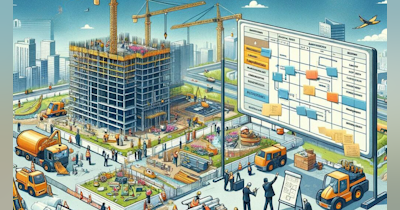Construction projects can be complex and time-consuming, especially smaller projects. Leading multi-thousand-dollar to billion-dollar-plus jobs taught me that the smaller ones sometimes take as much or more effort. I often use analogies to help recognize patterns in how teams work together. It's no secret that I love Scrum and building. Whether you're building homes, remodeling commercial offices, or working on a very complex commercial construction project, there are a few key things to borrow from the Scrum framework to ensure a successful outcome, no matter your current phase of work or familiarity with Rugby, the game that inspired the framework's name.
First, what is Scrum? Scrum is a framework for managing and completing complex projects. Dr. Jeff Sutherland named this framework after reading "The New New Product Development Game" HBR article by Hirotaka Takeuchi and Ikujiro Nonaka, where they described companies working like a rugby team moving as one force down the game field. I didn't play rugby growing up on the south side of Chicago as a kid, so I instead imagine the Scrum framework as an exciting football game. During the pre-game, the quarterback sets the overall strategy and goals for the team for this specific game, acting as the Product Owner. The development team members are the players who work together to execute the plan and put work in place. The Scrum Master is the defensive tackle or defensive end who ensures that the team follows Scrum's rules and principles and helps resolve any conflicts or issues that arise by blocking and tackling. The Sprint is the game with a defined time period during which the team works to achieve specific objectives. The Sprint Review and Retrospective are the post-game analysis, where the team gets feedback, reviews their performance, and makes plans for improvement.
Actions for Successful Project Outcomes:
- Plan ahead: Before beginning any construction project, it's important to have a clear plan in place. This includes a detailed budget, a timeline for completion, and a list of all materials and equipment needed. In Scrum, this information is part of the project Backlog.
- Be picky with your team members: Construction projects require various skilled professionals, such as architects, engineers, and contractors. Be sure to hire experienced professionals who have a disposition toward collaboration. In Scrum, regular communication is foundational among teams that live the value of Respect for People.
- Communicate visually: Good communication is crucial to any construction project. Make sure that all parties involved are on the same page and that everyone knows what to expect using signs, posters, posted logistics plans, or information radiators. Pull planning, or Scrum boards, radiate real-time information to make important information easily visible and accessible to everyone without the need for individuals to seek it out actively.
- Stay organized: Construction projects can quickly become overwhelming, so take time daily to keep organized. Keep all paperwork and other essential documents in one place and make sure that everyone is aware of the schedule and progress of the project, including cost information.
- Be prepared for unexpected challenges: Even with the best planning, unforeseen conditions challenge teams during the design and construction phases. Be ready to adapt and make necessary changes to ensure the project stays on track. In Scrum, we acknowledge that change is guaranteed and have processes like short-interval Sprint planning to enable the team to adapt and change as part of the work.
Scrum is a powerful tool that can help you finish your projects better and with less effort, even using just some essential parts of the system. Construction projects can be challenging and require significant effort to complete successfully. However, applying the Scrum framework can make the process easier and more efficient. Scrum is a framework designed specifically for managing complex projects, like an exciting football game, and I use it in a variety of construction projects. By borrowing key principles from the Scrum framework, you can ensure more successful outcomes for your construction project.
Are you working with Scrum to deliver more value with less effort and have more fun? Check out these Scrum training resources to help you and your team(s) achieve twice the work in half the time.
Using Mural to Start Construction Scrum |
Registered Scrum Master Self-Paced Course |











